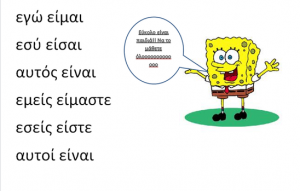Difference between revisions of "Language/Modern-greek-1453/Grammar/Verb-To-Be"
< Language | Modern-greek-1453 | Grammar
Jump to navigation
Jump to search
m (Vincent moved page Language/Modern-greek-1453/Grammar/Verbes to Language/Modern-greek-1453/Grammar/Verbs) |
|||
| (8 intermediate revisions by 3 users not shown) | |||
| Line 1: | Line 1: | ||
[[File:431254.png|thumb | <div class="pg_page_title">Conjugate the Greek Verb “To Be”</div> | ||
[[File:431254.png|thumb]] | |||
In today's lesson, you'll learn how to conjugate the verb "to be" in Greek. | |||
As you complete this lesson, consider broadening your horizons with these related topics: [[Language/Modern-greek-1453/Grammar/The-predicate|The predicate]], [[Language/Modern-greek-1453/Grammar/Homonyms-and-homophones|Homonyms and homophones]], [[Language/Modern-greek-1453/Grammar/How-to-Use-Be|How to Use Be]] & [[Language/Modern-greek-1453/Grammar/Contract-Verbs|Contract Verbs]]. | |||
==Greek Verb “To Be” in the Present (also link verb and an auxiliary verb)== | |||
{| class="wikitable" | {| class="wikitable" | ||
| | |+ | ||
!Indicative Mood | |||
!Subjunctive Mood | |||
!Imperative Mood | |||
!Participle | |||
|- | |- | ||
| | |εγώ είμαι | ||
εσύ είσαι | |||
αυτός-ή-ό είναι | |||
εμείς είμαστε | |||
εσείς είστε | |||
αυτοί-ές-ά είναι | |||
είναι | |||
|να είμαι | |να είμαι | ||
να είσαι | να είσαι | ||
| Line 61: | Line 29: | ||
να είμαστε | να είμαστε | ||
να είσαστε | να είστε/είσαστε | ||
να είναι | να είναι | ||
| | |does not exist | ||
|όντας | |όντας | ||
| | |} | ||
==Greek Verb “To Be” in the Future (Μέλλων)== | |||
| | {| class="wikitable" | ||
|+ | |||
|εγώ θα είμαι | |||
εσύ θα είσαι | |||
αυτός-ή-ό θα είναι | |||
εμείς θα είμαστε | |||
εσείς θα είστε /είσαστε | |||
αυτοί-ές-ά θα είνα | |||
|} | |||
==Greek Verb “To Be” in the Past (Imperfect- Παρατατικός)== | |||
| | {| class="wikitable" | ||
| | |+ | ||
|εγώ ήμουν | |||
εσύ ήσουν | |||
αυτός-ή-ό ήταν | |||
εμείς ήμασταν | |||
εσείς ήσασταν | |||
αυτοί-ές-ά ήταν | |||
|} | |||
| | |||
==Videos== | |||
===Learn how to conjugate the verb "to be" in Greek - είμαι=== | |||
<youtube>https://www.youtube.com/watch?v=tpFj8nJCYsc</youtube> | |||
===The Modern Greek Verb “To Be” Conjugation=== | |||
<youtube>https://www.youtube.com/watch?v=rYgyFVoKOjk</youtube> | |||
== | ==Other Lessons== | ||
* [[Language/Modern-greek-1453/Grammar/Discours-direct-indirect|Discours direct indirect]] | |||
* [[Language/Modern-greek-1453/Grammar/Words-written-with-γγ-or-γκ|Words written with γγ or γκ]] | |||
* [[Language/Modern-greek-1453/Grammar/Nouns|Nouns]] | |||
* [[Language/Modern-greek-1453/Grammar/Conditional-sentences|Conditional sentences]] | |||
* [[Language/Modern-greek-1453/Grammar/Homonyms-and-homophones|Homonyms and homophones]] | |||
* [[Language/Modern-greek-1453/Grammar/Subject-Verb-Agreement|Subject Verb Agreement]] | |||
* [[Language/Modern-greek-1453/Grammar/Declension-patterns-for-Greek-nouns|Declension patterns for Greek nouns]] | |||
* [[Language/Modern-greek-1453/Grammar/The-degrees-of-the-adjective|The degrees of the adjective]] | |||
* [[Language/Modern-greek-1453/Grammar/Verbs-Conjugation-Groups|Verbs Conjugation Groups]] | |||
* [[Language/Modern-greek-1453/Grammar/Syllabification|Syllabification]] | |||
<span links></span> | |||
Latest revision as of 16:26, 13 April 2023
Conjugate the Greek Verb “To Be”
In today's lesson, you'll learn how to conjugate the verb "to be" in Greek.
As you complete this lesson, consider broadening your horizons with these related topics: The predicate, Homonyms and homophones, How to Use Be & Contract Verbs.
Greek Verb “To Be” in the Present (also link verb and an auxiliary verb)[edit | edit source]
| Indicative Mood | Subjunctive Mood | Imperative Mood | Participle |
|---|---|---|---|
| εγώ είμαι
εσύ είσαι αυτός-ή-ό είναι εμείς είμαστε εσείς είστε αυτοί-ές-ά είναι |
να είμαι
να είσαι να είναι να είμαστε να είστε/είσαστε να είναι |
does not exist | όντας |
Greek Verb “To Be” in the Future (Μέλλων)[edit | edit source]
| εγώ θα είμαι
εσύ θα είσαι αυτός-ή-ό θα είναι εμείς θα είμαστε εσείς θα είστε /είσαστε αυτοί-ές-ά θα είνα |
Greek Verb “To Be” in the Past (Imperfect- Παρατατικός)[edit | edit source]
| εγώ ήμουν
εσύ ήσουν αυτός-ή-ό ήταν εμείς ήμασταν εσείς ήσασταν αυτοί-ές-ά ήταν |
Videos[edit | edit source]
Learn how to conjugate the verb "to be" in Greek - είμαι[edit | edit source]
The Modern Greek Verb “To Be” Conjugation[edit | edit source]
Other Lessons[edit | edit source]
- Discours direct indirect
- Words written with γγ or γκ
- Nouns
- Conditional sentences
- Homonyms and homophones
- Subject Verb Agreement
- Declension patterns for Greek nouns
- The degrees of the adjective
- Verbs Conjugation Groups
- Syllabification
